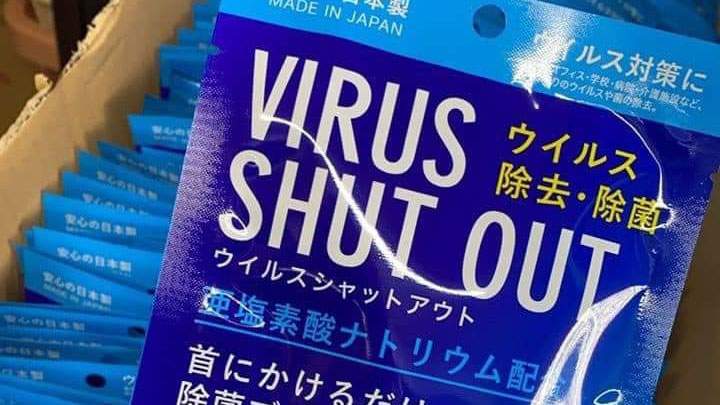
A Georgia woman who sold an unregistered pesticide, which she claimed protected against viruses such as COVID-19, has pleaded guilty to violating the Federal Insecticide, Fungicide, and Rodenticide Act (FIFRA).
Rong Sun, aka Vicky Sun, 34, of Fayetteville, Georgia, pleaded guilty today before U.S. Magistrate Judge John K. Larkins III. Sentencing has been scheduled for June 29 before Judge Larkins III.
“Registration under FIFRA helps ensure that pesticides sold in the U.S. work and are safe for humans. The trafficking in snake-oil remedies outside of FIFRA is a criminal act and anyone who does so, especially during this pandemic, will find federal law enforcement ready to stop them,” said Assistant Attorney General Jeffrey Bossert Clark for the Justice Department’s Environment and Natural Resources Division. “The U.S. Department of Justice will not stand by while criminal conduct risks people’s health and safety.”
“We will act quickly and decisively to protect the health of our community,” said U.S. Attorney Byung J. “BJay” Pak of the Northern District of Georgia. “As Georgia and the country battle a global pandemic, we need safe and effective treatments, not ones that threaten the health of our citizens.”
“This case shows that consumers need to be cautious of products that make unsubstantiated claims of controlling viruses,” said U.S. Environmental Protection Agency (EPA) Assistant Administrator for Enforcement and Compliance Assurance Susan Bodine. “EPA and our law enforcement partners continue to work to stop the sale of these illegal products. Consumers can help protect themselves by visiting epa.gov/coronavirus for a list of approved products.”
“Playing on people’s fears during this pandemic by offering false hope and the empty promise of protection is not only dangerous, it’s also reprehensible and illegal,” said acting Special Agent in Charge Robert Hammer, who oversees Homeland Security Investigations (HSI) operations in Georgia and Alabama. “HSI and its partners are working diligently to investigate and arrest those criminals that are trying to take advantage of Americans during this pandemic.”
“A large part of the U.S. Postal Inspection Service mission is to ensure public trust in the mail,” said Tommy D. Coke, Inspector in Charge of the U.S. Postal Inspection Service (USPIS) Atlanta Division. “When individuals challenge that mission, Postal Inspectors will aggressively investigate those seeking to deceive during this crisis for their own financial gain.”
According to the charges and other information presented in court, the defendant sold an unregistered pesticide, “Toamit Virus Shut Out,” through eBay, claiming that it would help protect individuals from viruses. Marketed as “Virus Shut Out” and “Stop The Virus,” the pesticide took the form of a card-shaped device to be worn around the user’s neck. The eBay listing depicted the removal of viruses by wearing the “Virus Shut Out” and “Stop The Virus” product. Additionally, the listing stated that “its main ingredient is ClO2, which is a new generation of widely effective and powerful fungicide recognized internationally at present. Bacteria and viruses can be lifted up within 1 meter of the wearer’s body, just like a portable air cleaner with its own protective cover.” It also stated that “[i]n extraordinary times, access to public places and confined spaces will be protected by one more layer and have one more layer of safety protection effect, thus reducing the risks and probability of infection and transmission.”
Under FIFRA, the EPA regulates the production, sale, distribution and use of pesticides in the United States. A pesticide is any substance intended for preventing, destroying, repelling, or mitigating any pest, which includes viruses. Pesticides must be registered with the EPA. Toamit Virus Shut Out was not registered, and it is illegal to distribute or sell unregistered pesticides. Sun imported the pesticide from Japan and later sold it to individuals around the United States
This case is being investigated by the EPA-Criminal Investigation Division, HSI, and USPIS.
Senior Counsel Krishna Dighe of the Environment and Natural Resources Division’s Environmental Crimes Section and Assistant U.S. Attorney Christopher J. Huber, Deputy Chief of Complex Frauds, are prosecuting the case.


Bulloch Lifestyle
Adoptable Pet of the Week: Night Wing

Bulloch Public Safety
11/04/2024 Booking Report for Bulloch County

Chattooga Schools
State Agency Career Fair to be held at GNTC’s Floyd County Campus

Chattooga Local News
Recovery Alive to Celebrate 1-Year Anniversary on November 7th

Bulloch Public Safety
11/04/2024 Booking Report for Bulloch County

Bulloch Public Safety
10/21/2024 Booking Report for Bulloch County

Bulloch Public Safety
10/08/2024 Booking Report for Bulloch County

Bulloch Public Safety
10/17/2024 Booking Report for Bulloch County

Bulloch Public Safety
10/28/2024 Booking Report for Bulloch County




